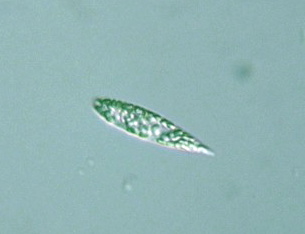
 Astasia longa
Astasia longa
Pringsheim, 1936
 Genus:
Only 1 flagellum emergent from canal, colourless; eyespot absent;
cell body fusiform or elongated, plastic, with pronounced euglenoid movement;
many species, mostly freshwater (Illustrated Guide, 1985).
Genus:
Only 1 flagellum emergent from canal, colourless; eyespot absent;
cell body fusiform or elongated, plastic, with pronounced euglenoid movement;
many species, mostly freshwater (Illustrated Guide, 1985).
Species:
Cell body spindle in shape, posterior end slightly pointed,
55-60 μm long, 8 μm wide
(fixed sample); a locomotive flagellum 1/3 0 1/2 of the cell body in length;
paramylon bodies bar-shaped or ellipsoidal, small
(An Illustrated Guide to Freshwater Zooplankton in Japan, 2000).
Cell body 70-96 μm long, 10-14 μm wide,
two large paramylon bodies ring-shaped
(An Illustrated Guide to Freshwater Zooplankton in Japan, 2000).
|
Astasia longa,
cell body 38 μm long, 7.5 μm wide,
x 640, drainage ditch exit at Ichino-kawa (river), Namegawa town, Saitama Pref., Japan, April 18, 2004 by Y. Tsukii
 31 μm
31 μm
 63 μm
63 μm
 94 μm; x 640
94 μm; x 640

Astasia longa Pringsheim, 1936:
Cell body spindle in shape, posterior end slightly pointed,
55-60 μm long, 8 μm wide
(fixed sample); a locomotive flagellum 1/3 0 1/2 of the cell body in length;
paramylon bodies bar-shaped or ellipsoidal, small
(An Illustrated Guide to Freshwater Zooplankton in Japan, 2000).
Cell body 70-96 μm long, 10-14 μm wide,
two large paramylon bodies ring-shaped
(An Illustrated Guide to Freshwater Zooplankton in Japan, 2000).
Outline shape similar to that of Euglena gracilis
(How to know the protozoa, 1979).
Astasia lagenula Schewiakoff:
Cell body cylindroid with posterior end rounded, 45 μm long, 10 μm wide;
a flagellum more or less longer than the body length; ovoidal paramylum granules
(WPRNO).
Astasia klebsi :
Astasia dangeardi :
Outline shape similar to that of Euglena rostrata
(How to know the protozoa, 1979).
Astasia captiva :
Please click on images for viewing enlarged.
Copyright
Protist Information Server
 Genus:
Only 1 flagellum emergent from canal, colourless; eyespot absent;
cell body fusiform or elongated, plastic, with pronounced euglenoid movement;
many species, mostly freshwater (Illustrated Guide, 1985).
Genus:
Only 1 flagellum emergent from canal, colourless; eyespot absent;
cell body fusiform or elongated, plastic, with pronounced euglenoid movement;
many species, mostly freshwater (Illustrated Guide, 1985).
